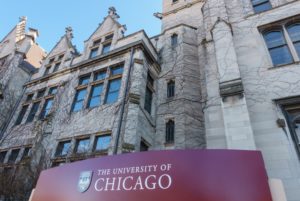
Like many post-graduate researchers, I reached the halfway point of my PhD and I began wondering where I was heading next. I knew I wanted to do a post-doc but I wasn’t sure where and I knew I had limited time in which to make my decision. I attended the Alzheimer’s Research UK conference in Oxford in 2014, where a notable UK-based Professor was running the PhD student day and discussing some of the options for us as we looked for positions after our PhD. He had done a post-doc in the US and had forged as successful career back in the UK following his return. So that was that. Decision made. I was going to America for my post-doc. Now I just needed to find a lab that would take me. Here were a few thoughts on my experience of finding a post-doc in the US (some of which will be applicable to the UK too) and a few things I wish I’d known!
Finding your US post-doc
Why choose the US?
There are many world-class institutions in the UK, so why bother with moving to the US? For me some of it was about the perception of the quality of training I was going to receive. I had heard more than one academic in the UK refer to a post-doc in the US at “gold-standard” and I’ve heard many UK colleague refer to academics having “BTA” (been to America). In reality, I don’t think that the quality of post-doctoral training is significantly better in the US than it would be in the UK but I think its perception as a great place for post-doctoral research can be beneficial to ERCs . For me, a big part of the decision was the feeling of “now is a good time”. I’m young, I had few commitments and thought a few years working in another country would be a great experience. There were several labs in the US whose work had heavily influenced my research as a PhD student and I was unsure what my eventual career path would look like. The sheer size of the academic and industry market in the US makes it an enticing prospect for an ERC and I think can certainly be beneficial when looking for your post-doctoral position,
Location
My process for finding a post-doc probably wasn’t very traditional since my first thoughts were about geographical location. I wanted to make sure I was continuing my training somewhere I knew was going to be a great place to live and that if my post-doc experience crumbled around me, at least I could have fun outside of the lab. The US is big (obviously) and its harder to go for a quick change of scenery to reset than it is in the UK. So, make sure you pick somewhere with reset opportunities within reach! Make sure you look long and hard at the cost of living. Unfortunately there are places in the US a post-doc salary doesn’t get you very far.
The PI
After I identified cities/states I was interested in living in I looked for PIs there that I felt I the right kind of experience to be a good fit for their lab and started firing off emails with my CV attached. Most of the PIs I contacted got back to me relatively quickly either saying they didn’t have the funding to expand at the time or offering a skype interview. I actually applied for the lab I now work in because I saw an expired job advert on the FENS website. I guess I’m saying don’t be put off pursuing a PI you’re really interested in working for by the fact they’re not currently advertising a post. If you’re an exceptional candidate you’d be surprised how quickly they can make some money appear! If you’re going to a conference towards the end of your PhD and you know the PI(s) you want to work for will be there, email them before you go. Its very commonplace for US PIs to do informal interviews at conferences. In fact, the whole hiring process seems much less rigid in the US with many PIs just waiting for the right candidate to come to them rather than constantly advertising positions. Think long and hard about the kind of PI/lab you want. Large labs with big name PIs are great for some people, while smaller labs with new PIs are preferable to others. The same same rule goes as for when you’re choosing a PhD, look at the previous post-docs’ publication records and where they’ve ended up. This should give a good indication of the PI’s skills as a mentor.
The project
Coming out of my PhD I wanted a project I felt was already up and running to make sure I wasn’t going to flounder around for two years with nothing to show. In your interviews, take the time to discuss on-going projects in the lab and how you can contribute to them. If you’re brimming with brilliant ideas, let the PI know and ask whether they foresee you being able to pursue these in the lab. Make sure you also discuss how they could be funded and what happens when you want to leave with the ideas and projects you generated.
The environment
One thing I heard pretty regularly before I came out to the US and still get asked now by colleagues in the UK is whether the reputation for post-docs being worked into the ground in the US is true. I think, as it does in the UK, this totally varies from PI to PI. I work hard, there is no doubt about that. But I think it’s possible to set boundaries early in your post-doctoral work as to how far you’re willing to go. Try and talk to the current post-docs and students in the lab before you make a decision on taking a job. Push them to be honest about what the lab environment is like. The National Institute of Health in the USA actually stipulates that all post-docs should be considered “trainees” and therefore should have an allocated amount of time for pursuing career development opportunities outside of their bench work. Find out what there is on offer socially within your post-doc/departmental community. When you move across the Atlantic you’re going to need to make some new friends!

The institution
Try an find out as much information about the institution as you can. This applies to many levels of your job. Your salary and job benefits (healthcare, dental, vision, pension, vacation) are extremely important in the US and cost of living varies hugely. Most post-doctoral programs in the US will not support you financially for moving out to the US. Starting your life from scratch again is expensive so make sure you’re prepared in advance. Take time to look into other elements of post-doctoral life that may be important to you including institutional support for post-doctoral staff and their dependents (spouses, children etc.), career development opportunities within the university, how the contracts and visas work, how the lab you’re looking to work for fits in to its department/institution, the list goes on.
Funding
Talk to the PI about their funding situation and how long they would be able to employ you for. Many US PIs will ask you to apply for ECR grants to help out with lab costs, but it may be sensible to make sure that your position I not absolutely dependent on obtaining funding. Most funding bodies I’ve encountered do not restrict funding opportunities for non-US citizens including the major Alzheimer’s disease funders. You should be able and will most likely be encouraged to apply for small funding opportunities and fellowships whilst you’re in your post-doctoral position.
To be totally honest, I probably didn’t do most of these things when I was looking for a post-doc. I only realise now how important a lot of them are! Most of all, if you’re going to move 3000-5000 miles from home, make sure you’re choosing a post-doc experience that fits for you personally. Its unlikely the post-doc you chose will tick every box, but find one that ticks as many as possible.
Back in July we shared a podcast recorded with panellists who had travelled in the other direction to work in the UK – have a listen, the stories and lessons learnt can apply to anyone moving away to study overseas [1].
Author
Dr Robert Andrew is a Post-doctoral Scholar researching the Mechanisms of Alzheimer’s disease pathogenesis. Having completed undergraduate and post-graduate degrees at Newcastle University, Leeds University and the University of Manchester; Rob made the leap to continue his work overseas and is now at The University of Chicago.
You can follow Rob on Twitter Follow @robjandrew [2]